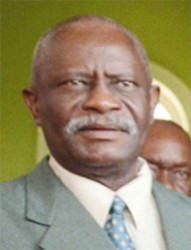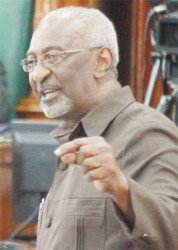Former acting Chief Justice Ian Chang has ruled that APNU+AFC ministers Winston Felix and Keith Scott cannot continue to sit as non-elected members in the National Assembly since they were both elected as part of the coalition’s list of national candidates.
“The court can find no legal or constitutional basis on which they can claim that right to sit in the Assembly, whether as voting or non-voting members thereof – despite their appointed status as executive Ministers of Government,” Justice Chang wrote in his ruling, which was delivered from the bench yesterday at the High Court, in Georgetown.
On June 10, the first day of the sitting of the 11th Parliament, the PPP/C had called on Clerk of the National Assembly Sherlock Isaacs to not have the oath administered to Felix, who is Minister of Citizenship, and Scott, who is now Junior Minister of Social Protection, as their presence as technocrats violated several principles of the constitution.

PPP member Desmond Morian had initiated the legal challenge to Felix and Scott sitting in the National Assembly as non-elected members and sought a declaration that they are not lawful members of the National Assembly and an order that they be prevented from sitting in the Assembly unless their names are extracted from the coalition’s list.
Morian had also asked the court to direct the Speaker of the National Assembly, who was named a respondent in the matter, to prevent the two ministers from sitting in the Assembly, unless and until their names were extracted from the APNU+AFC national top-up list of candidates for the May 11, 2015 general elections.

The judge said yesterday that the question of the legal entitlement to sit in the National Assembly is a matter of constitutional legality or illegality, which falls outwith the internal operations of the Assembly and that, therefore, the court has the jurisdiction to issue a writ of Prohibition or Mandamus to the Speaker to prevent or to put an end to unconstitutionality.
He, however, said that in the instant case, “the court does not foresee that the Honourable Speaker will not act in accordance with the dictates of the law and the Constitution as declared by the Court.” The judge said the court, therefore, did not see the necessity of giving any direction to the Speaker at this juncture. In deference to the doctrine of judicial restraint, the judge said the court refrains from issuing a coercive order against the Speaker.
Expressing his satisfaction with the judgement, Morian’s attorney, Anil Nandlall said that the challenge by the applicant and the subsequent ruling by the court goes to establish the “incompetence” that exists in the government.
The former Attorney General questioned, “If the government cannot properly, accurately and legally put the right persons to sit in the Parliament, how can they tackle the important issues facing the people of this country?”
Elected members
In his ruling, Chang declared that Felix and Scott are elected members of the National Assembly insofar as they were elected as part of the APNU+AFC slate but they do not hold seats and cannot sit in the National Assembly since their names were not among those extracted from the list of candidates to hold seats.
He noted that Article 232 of the Constitution defines “elected member of the National Assembly” as meaning “any person elected as a member of the National Assembly pursuant to the provisions of paragraph 2 of Article 60 and article 160 (2).
Paragraph (2) of Article 60 of the Constitution provides that “subject to the provisions of article 160 (2), such number of members of the National Assembly shall be elected in accordance with the system of proportional representation prescribed in Article 160 (1).”
The judge further noted that Article 160 (1) provides, among other things, that “subject to the provisions of the next following paragraph, the system of proportional representation referred to in article 60 (2) for the election of such members of the National Assembly as shall be determined by the Assembly, shall be as follows: (c) the seats of the elected members of the Assembly, as determined under this paragraph, shall be allocated between the lists in such manner….”
As a result, the judge reasoned that “it is clear from Article 160 (1) (c) that the seats of the National Assembly are not allocated to specific persons but to the successful lists of candidates cumulatively. It is further clear that members of such successful lists are constitutionally recognised as “elected members” even before the stage of allocation between those successful lists is reached – let alone before extraction (or selection) is made by the representatives of such lists after such allocation of seats between or among the successful lists.”
Justice Chang noted that Article 160 (3) (a) prescribes, “subject to the provisions of this Constitution, Parliament may make provision for the extraction from the lists and declaration of the names of candidates who have been elected.”
Article 160 (3) (a) (v), Justice Chang said, makes it clear that extraction is made from the lists of candidates who have been elected and that, therefore, the status of a candidate as an elected member of the Assembly necessarily precedes their extraction by the representative of that list to be holders of seats in the Assembly on behalf of the other persons named thereon.
Justice Chang added that if, as contended by counsel for the respondents, a person becomes an elected member of the Assembly only when his name has been extracted from the list of candidates to hold one of the number of seats allocated to that list, it leads to the absurd result that persons on that successful list, whose names have not be so extracted, would be “non-elected” members of the Assembly despite the fact that the collective list has been successful in winning seat or seats. “It is precisely because they all remain elected members that they are eligible for extraction later if a vacancy arises and there is a need for substitution in the Assembly itself,” the judge declared.
He also said that there is clearly a distinction between “elected members” and “persons qualified to be elected as members” of the Assembly for the purpose Ministerial appointment by the President. The significance of such a distinction, he added, becomes apparent when regard is had to Article 105, which provides for a Minister, who is not an elected member at the time of his appointment, to be a non-voting member of the Assembly by virtue of holding the office of Minister.
Justice Chang reasoned further that “clearly, Article 105 speaks only to those Ministers who are “qualified to be elected as members of the Assembly” but who are not “elected members” of the Assembly at the time of their Ministerial appointments (Technocrat Ministers).”
The judge surmised that it appeared to the court that it is legally possible for the President to appoint persons as Ministers from his party’s successful list of candidates whose names the representative of the list has not seen it fit to extract to hold seats in the Assembly. “After all, the President’s power to appoint Ministers is executive in purpose while the representative of the list’s power to extract is representative in purpose – the President himself being no part of the National Assembly (in contradistinction to Parliament),” the judge said.
Justice Chang said that in such a case, like the President himself, those ministers will not be holders of seats in the National Assembly. He said that, on the other hand, however, if the President appoints as Minister a person who is not a member of a successful list of candidates but is a qualified elector, that person holds a seat in the national assembly as a non-elected member thereof but has no right to vote therein (Articles 103 (2) and 105).
But the judge said there appears no provision in the Constitution which allows a Minister, who is an elected member of the Assembly, but whose name has not been extracted from a successful list of candidates, to hold a seat in the Assembly even as a non-voting member.
He added that since Felix and Scott are elected members of the Assembly for reason that their names did appear on the successful APNU+AFC list of candidates, Article 105 of the Constitution, which applies to non-elected members of the Assembly, cannot apply to them as elected members of the Assembly.
The court, he further reasoned, can find no legal or constitutional basis on which they can claim that right to sit in the Assembly, whether as a voting or non-voting members thereof – despite their appointed status as executive Ministers of the Government.
Jurisdiction
Attorney General (AG) Basil Williams, the other named respondent in the matter, had argued that the High Court had no jurisdiction to hear the matter, which was filed by motion and not via an election petition.
Justice Chang, however, stated that it was obvious the issues which have been considered and determined by the court do not relate to any challenge to the legal validity or the conduct of the election or with the allocation of seats to the successful lists of candidates of the respective political parties.
Rather, he said it was on the a priori assumption that the election had been validly conducted and the allocation of seats validly made, the issues relate to matters ex post facto the completion of the election processes.
According to Justice Chang, the determination of such issues could not therefore be matters which attract a challenge by way of an election petition. “The submission of counsel for the respondents that the applicants ought to have approached the court by way of an election petition is therefore misconceived and accordingly overruled,” he asserted.









